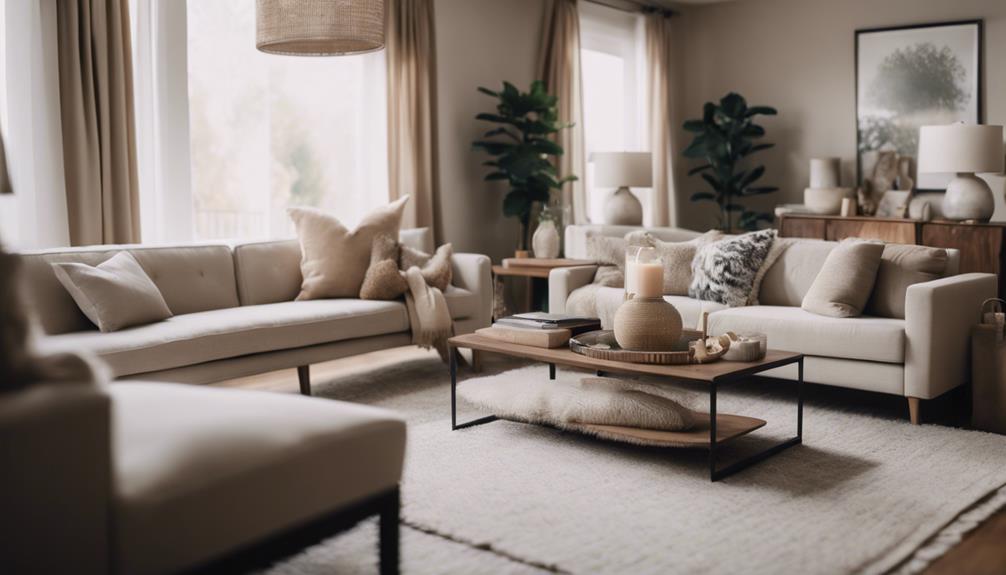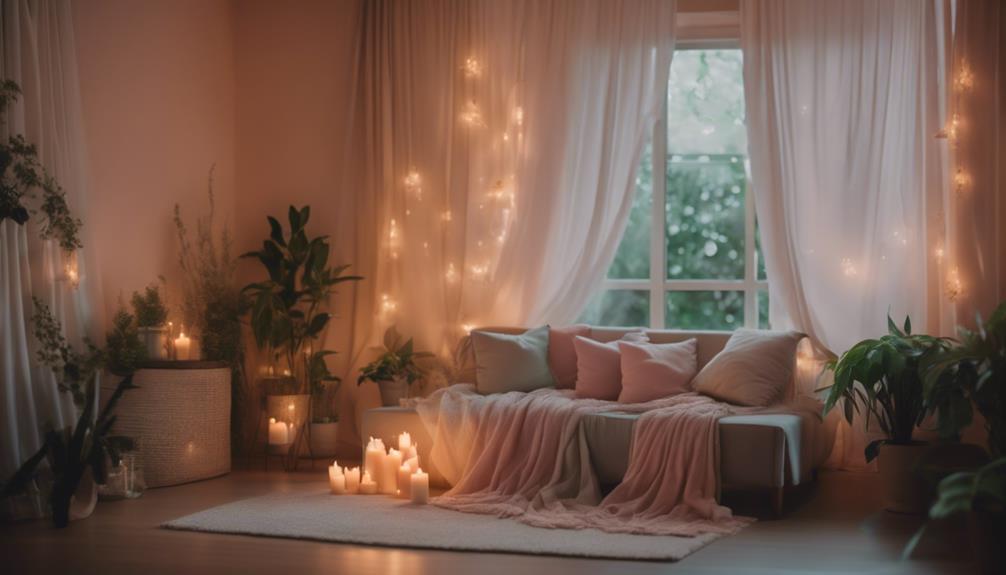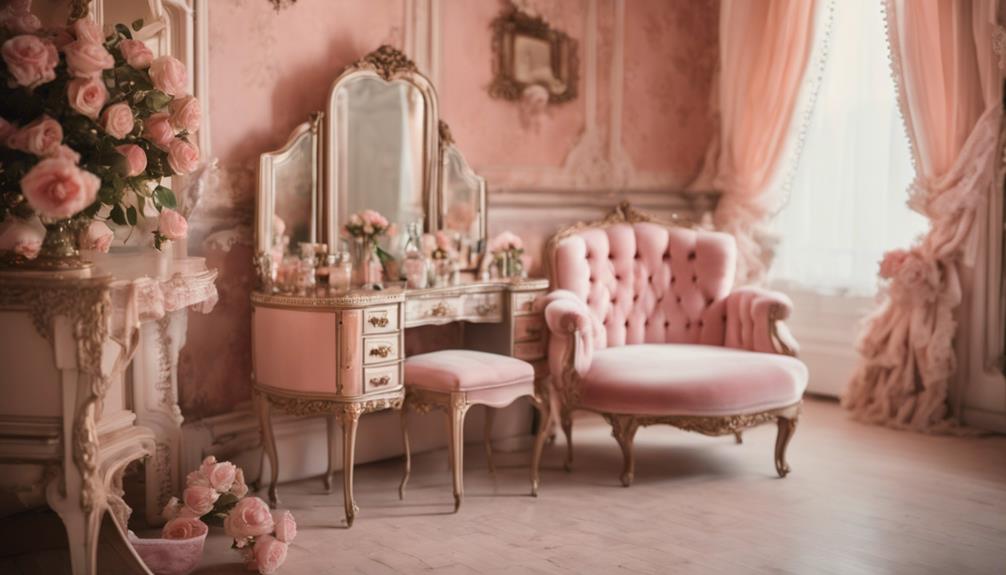Stepping into the world of interior decorating involves blending design flair with client preferences to transform spaces into engaging and functional marvels. Interior decorators curate decor pieces, coordinate lighting and furniture, and understand client tastes. Proficiency in CAD, design aesthetics, budgeting, and project management is crucial. From creating cohesive looks to meeting clients' needs, every detail matters. Education, certificates, and drawing skills enhance qualifications. Design acumen, creative vision, attention to detail, spatial awareness, and color coordination are essential. Salaries average $33,404 yearly, influenced by experience and specialization. Stay tuned to discover more about this dynamic career field.
Key Takeaways
- Transform spaces through aesthetic enhancements.
- Select decor elements and coordinate furniture.
- Understand client preferences and execute their vision.
- Utilize design expertise and creative vision.
- Enhance spaces with color coordination and spatial awareness.
Overview of Interior Decorating Careers
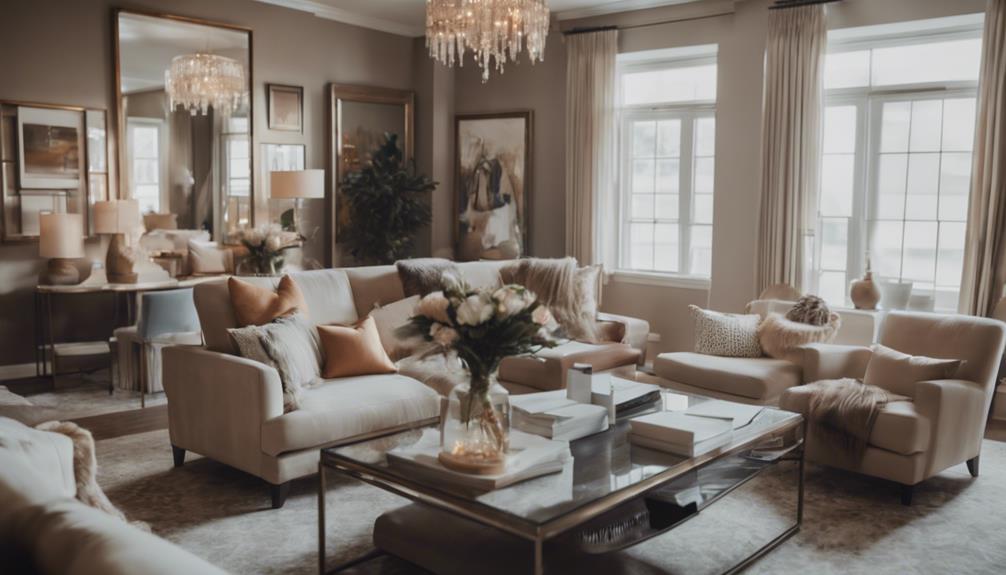
Exploring interior decorating careers reveals a dynamic field focused on enhancing spaces through aesthetic enhancements.
Interior decorators play a vital role in transforming various environments, such as residential and commercial settings, into visually appealing and functional spaces.
Their responsibilities encompass a wide range of tasks, including selecting decor items, coordinating lighting and furniture choices, and understanding the preferences of their clients.
These professionals need a diverse set of skills to excel in their roles, such as proficiency in CAD software for design planning, a keen eye for design aesthetics, strong budget management capabilities, and the ability to coordinate projects effectively.
Job Responsibilities of Interior Decorators
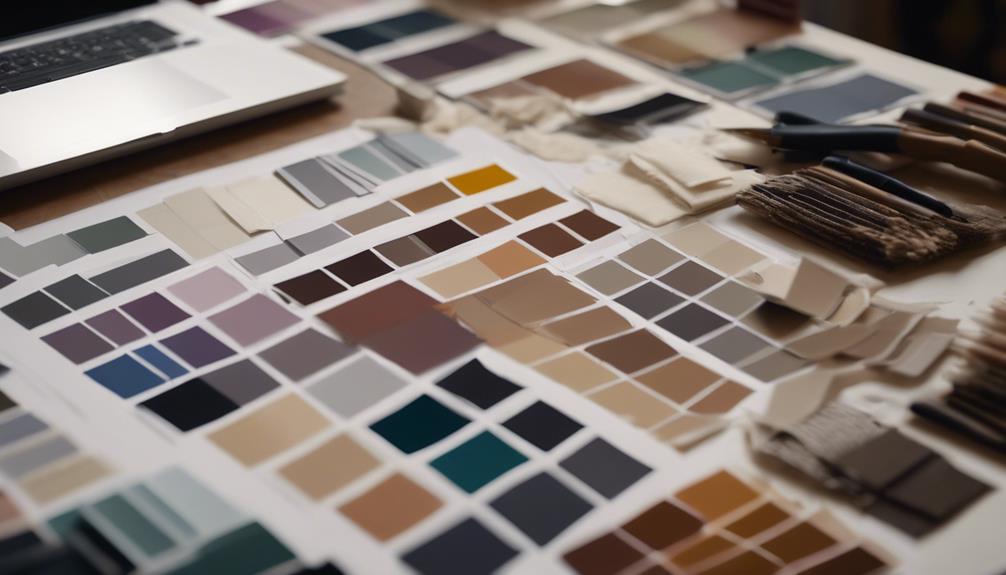
Interior decorators take charge of enhancing both the functionality and visual appeal of living and work spaces. They do this by selecting decor elements and coordinating design aspects to fulfill clients' visions. Understanding clients' needs and preferences is vital for interior decorators as they work to bring to life the vision for a space.
Their responsibilities include:
- Choosing and arranging decor elements such as furniture, lighting, and accessories to create a cohesive look.
- Executing clients' vision for a space by incorporating their ideas and preferences into the design.
- Selecting paint colors that complement the overall aesthetic and ambiance of the space.
- Making decisions on lighting fixtures to enhance the mood and functionality of the area.
- Ensuring that all decor elements work together harmoniously to achieve a pleasing and visually appealing result.
Education and Training Requirements

When considering a career in interior decorating, one may find that formal education and training can greatly enhance opportunities for success in the field. While interior decorators don't necessarily require a formal degree, completing education programs in interior decorating can be highly beneficial. These programs offer specialized training at various levels through certificates that help individuals develop essential skills and knowledge in the field. Additionally, obtaining accreditation from reputable organizations such as CID and IDS is recommended for interior decorators, as it provides credibility and demonstrates a commitment to professionalism.
Many clients and firms tend to prefer interior decorators with some form of formal education and training, as it showcases a level of expertise and competence in the field. Additionally, while not mandatory, having drawing skills can further enhance the qualifications of interior decorators, making them more well-rounded and capable of effectively communicating their design ideas.
Essential Skills for Interior Decorators
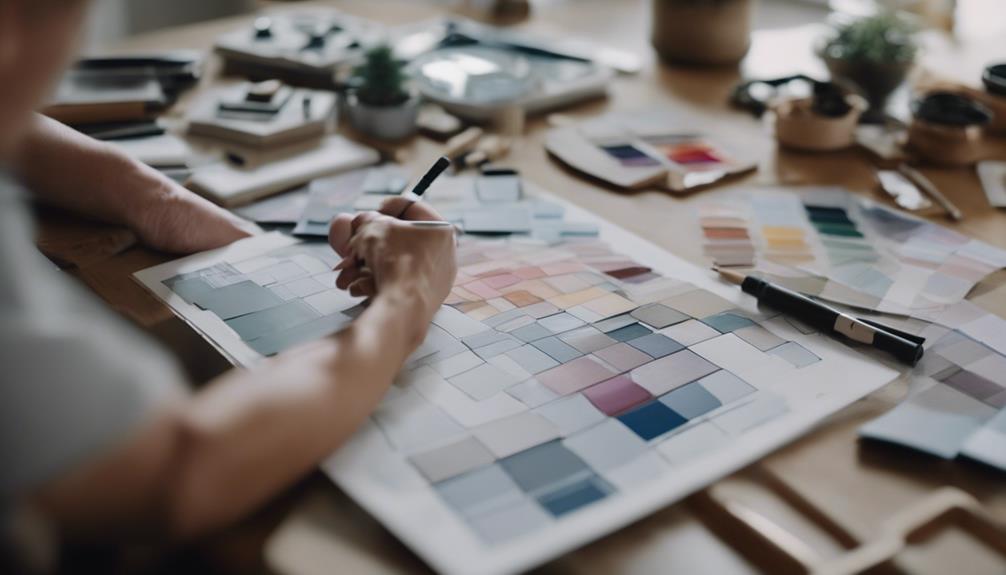
As interior decorators, we must possess design expertise to bring life to spaces. A creative vision to envision unique concepts is also crucial. Additionally, a detail-oriented mindset is necessary to guarantee every element complements the overall aesthetic.
These skills are vital in transforming ordinary rooms into extraordinary spaces that reflect clients' personalities and preferences. By honing these essential skills, we can create enchanting interiors that leave a lasting impression on our clients.
Design Expertise Required
Developing design expertise is essential for interior decorators to excel in transforming spaces effectively and aesthetically. As interior decorators, we must possess a combination of skills to achieve this goal.
- Spatial Awareness: Understanding how to utilize space efficiently and creatively.
- Color Coordination: Knowing how to harmonize colors to create the desired atmosphere.
- Knowledge of Design Principles: Grasping fundamental design concepts to enhance visual appeal.
- Proficiency in Computer-Aided Design (CAD): Using technology to plan and visualize designs accurately.
- Project Management Skills: Organizing tasks, resources, and time effectively to meet project goals.
Creative Vision Essential
Our creative vision serves as the cornerstone of our success as interior decorators, guiding us in enhancing the aesthetics of living and work spaces effectively.
Exceptional design sense is important for making informed decisions on decor, lighting, and furniture selections, ensuring a cohesive and visually appealing result.
Understanding and executing clients' vision for a space is necessary in meeting their needs and creating spaces that resonate with them.
Interpersonal skills are essential for communicating effectively with clients, understanding their preferences, and building strong working relationships.
As interior decorators, we must strike a balance between creativity and practicality to oversee both functional and aesthetic improvements in spaces.
Detail-Oriented Mindset Crucial
Possessing a meticulous attention to detail is indispensable for interior decorators aiming to elevate the visual appeal of spaces. When it comes to interior design, a detail-oriented mindset is essential for success. Interior designers need to focus on enhancing the aesthetics of rooms by paying attention to small elements like color coordination, texture selection, and spatial organization. The ability to notice subtle design nuances and make precise decisions is key in creating visually appealing spaces. By excelling in intricate design features, interior decorators can transform rooms into aesthetically pleasing and functional spaces. Detail orientation is what allows interior decorators to truly showcase their talent and craft in the world of interior design.
Small elements matter in interior design.
Color coordination is essential.
Texture selection plays a significant role.
Spatial organization enhances the aesthetics.
Subtle design nuances are important to notice.
Salary Expectations in Interior Decorating

When considering a career in interior decorating, it's important to have an understanding of the salary expectations in the field.
The average salary for interior decorators in the United States is approximately $33,404 per year, with hourly rates averaging around $16.06.
Factors such as experience, location, client base, qualifications, and marketing expertise can all influence an individual's income potential in this profession.
Average Salary Range
In the field of interior decorating, the average salary range plays a key role in understanding the financial landscape for professionals in this industry. When considering the earning potential of an interior decorator, it's important to note that the average salary in the United States is around $33,404 per year, with an hourly rate of approximately $16.06.
However, individual incomes can vary greatly based on factors such as experience, location, client base, qualifications, and marketing expertise. Additionally, salary expectations for interior decorators can be impacted by the level of specialization, industry focus, and clientele served. Interior decorators also have the opportunity to earn extra income through freelance projects, consultations, or developing their product lines.
Continuous skill development, networking, and industry knowledge play important roles in increasing earning potential for interior decorators.
Factors Affecting Pay
Considering the various factors that impact salary expectations in the field of interior decorating, it's evident that individual incomes can greatly vary based on experience, location, client base, qualifications, and marketing expertise.
The average salary for an interior decorator is around $16.06 per hour in the United States, with an estimated annual salary of $33,404. Income can fluctuate depending on market demand, geographical location, and the decorator's reputation and portfolio.
Those with more experience and specialized skills tend to earn higher incomes. Understanding these factors influencing pay is essential for interior decorators to set realistic salary expectations and navigate income variation within the industry.
Growth Opportunities
Exploring growth opportunities in interior decorating entails understanding how various factors such as experience, specialization, and effective marketing strategies can impact salary expectations for decorators. When considering job outlook and salary potential in interior decorating, it's essential to keep in mind the following key points:
- The average salary for interior decorators is approximately $16.06 per hour and $33,404 annually in the United States.
- Individual incomes can vary based on factors like experience, location, client base, qualifications, and marketing expertise.
- Salary expectations tend to increase with experience, specialization, and successful marketing strategies.
- Enhancing skills, networking, and building a strong client base are essential for boosting salary growth.
- There are ample opportunities for interior decorators to increase their earnings through strategic career development.
Job Outlook for Interior Decorators

With a projected 5% decline in the interior design sector by the US Bureau of Labor Statistics from 2019-2029, interior decorators are facing challenges in the job market. Despite this decline, job growth opportunities still exist for interior decorators who enhance their skills and networking within the industry. Improving skills such as proficiency in computer-aided design (CAD), knowledge of sustainable design practices, and staying updated on the latest trends can make decorators more competitive in the field.
Networking with other professionals in related industries, attending trade shows, and building strong relationships with suppliers and clients can also open doors to new opportunities.
In a competitive job market, interior decorators need to stay proactive in expanding their skill set and establishing valuable connections. By focusing on continuous learning, honing their expertise, and cultivating a robust professional network, decorators can navigate the challenges and carve out a successful career path in the dynamic world of interior decorating.
Building a Successful Portfolio
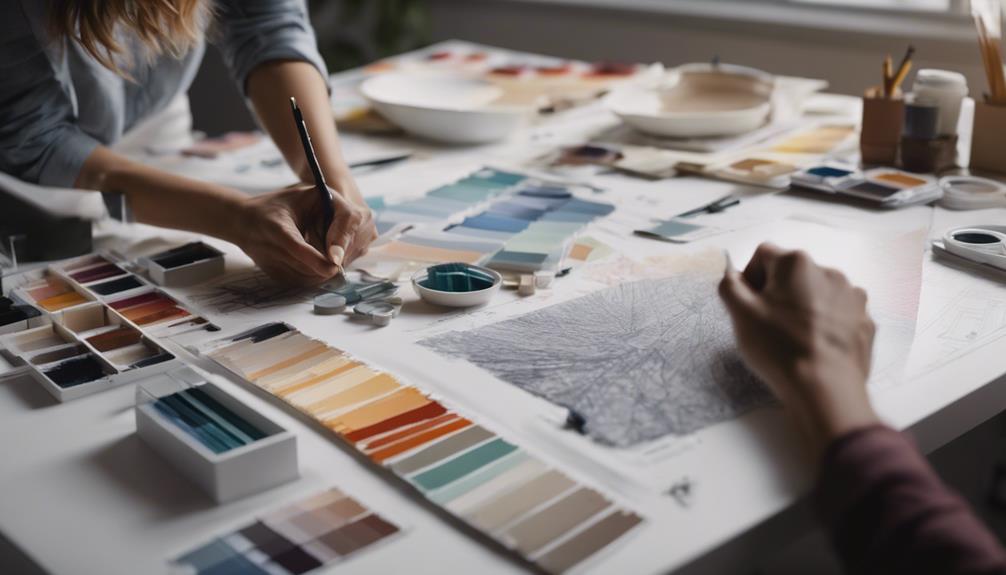
To create a compelling interior decorating portfolio, we must curate a diverse collection of projects that showcase our expertise and creativity. When assembling your portfolio, consider these key elements:
- Range of Projects: Include a variety of projects that reflect different styles, spaces, and design solutions to demonstrate your versatility and skills in interior decorating.
- Before-and-After Photos: Incorporating before-and-after images can effectively showcase your ability to transform spaces and highlight your design capabilities.
- High-Quality Images: Guarantee your portfolio includes high-quality images with good lighting and composition to make a strong visual impact on potential clients or employers.
- Client Testimonials: Adding client testimonials or feedback can provide social proof of your skills and professionalism, enhancing the credibility of your work in the eyes of others.
- Regular Updates: Continuously update and refine your portfolio with new projects and skills development to show growth, versatility, and relevance in the competitive field of interior decorating.
Networking Opportunities for Decorators

Networking organizations provide valuable opportunities for interior decorators to connect with industry professionals and enhance their career prospects through collaboration and knowledge-sharing. By joining professional organizations such as the Interior Design Society and Certified Decorators International, decorators can tap into a wealth of resources for career development. These organizations offer avenues for building networks, gaining certification, and staying updated with industry developments. Networking events, conferences, and workshops hosted by industry organizations present ideal platforms for decorators to expand their connections and stay abreast of the latest trends and practices in the field.
Additionally, building relationships with peers, professors, and admired designers can provide valuable insights and collaboration opportunities for decorators. Utilizing online platforms, attending trade shows, and participating in industry events are also effective ways for interior decorators to broaden their network and access new career opportunities. By actively engaging in networking opportunities and staying connected within the industry, decorators can foster professional growth and enhance their visibility in the competitive field of interior decorating.
Staying Current With Design Trends
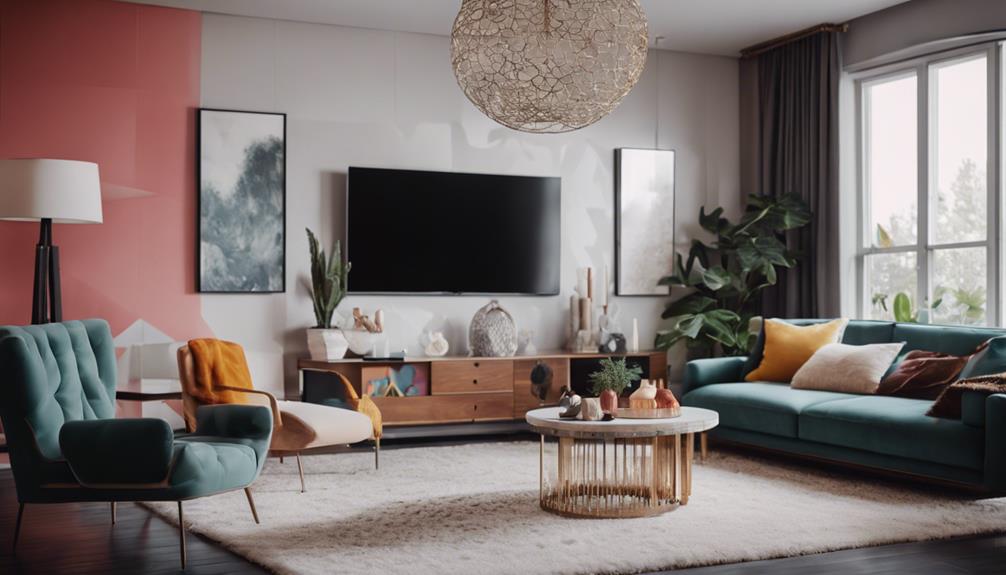
Staying abreast of design trends in interior decorating is essential for ensuring our work stays relevant and innovative for clients.
To stay current with design trends, interior decorators should:
- Subscribe to design magazines and trade publications for industry insights and inspiration.
- Follow tastemakers on social media platforms to receive trend updates and creative ideas.
- Explore resources like 1stDibs, Incollect, and Chairish to find unique vintage pieces and stay ahead of design trends.
- Engage with interior design trends through magazines, blogs, and design apps to maintain relevance and creativity.
- Keep up with evolving design trends to offer clients modern, innovative, and personalized design solutions.
Frequently Asked Questions
Is Interior Decorating a Good Career?
Interior decorating can be a good career choice for those with a passion for design. Opportunities exist despite a projected decline in the industry. Enhancing skills and networking can boost job prospects.
Trends like sustainability and smart technology are shaping the field. With dedication, it's possible to build a successful career in interior decorating.
What Is the Career Path for an Interior Decorator?
Starting on a journey as an interior decorator entails a well-rounded path. Education, experience, portfolio building, and networking are key steps. These elements shape our development and pave the way for a successful career.
What Exactly Does an Interior Decorator Do?
When considering what an interior decorator does, it's crucial to comprehend their role in enhancing the aesthetics and functionality of living and work spaces. This involves making decisions on decor, lighting, and furniture to create appealing designs.
Interior decorators work closely with clients to bring their vision to life and guarantee that the space meets both their preferences and functional needs. Their focus is on selecting and arranging decor elements to improve the visual appeal of a room.
How Do I Start a Career as a Decorator?
When starting a career as a decorator, we must focus on developing essential skills like spatial awareness, color coordination, and design principles. Pursuing education in interior design, architecture, or related fields will provide foundational knowledge.
Internships or apprenticeships are vital for gaining practical experience. Obtaining relevant certifications or licenses will enhance credibility.
Lastly, building a strong portfolio showcasing our work is essential for attracting clients and employers.
Conclusion
To sum up, a career in interior decorating offers a variety of opportunities for creative individuals to showcase their talent and design skills. With the right education, training, and essential skills, interior decorators can expect a competitive salary and promising job outlook.
Building a successful portfolio, networking with industry professionals, and staying current with design trends are key aspects to thriving in this field. Overall, pursuing a career in interior decorating can lead to a fulfilling and rewarding profession.
